If modernism heralded a moment of socio-political, cultural and aesthetic transformation, it also instigated a refashioning of how we think about, encounter, and live with animals. Beasts abound in modernism. Virginia Woolf’s spaniel, T.S. Eliot’s cats, James Joyce’s earwig, D.H. Lawrence’s snake, Samuel Beckett’s lobster, and Djuna Barnes’s lioness all present prominent examples of where animals and animality are at the forefront of modernist innovation. At stake in such beastly figurations are not just matters of species relations, but questions of human animality and broader ideas of social relations, culture, sex, gender, capitalism, and religion. Modernism’s interest in the figure of the animal speaks to the immense changes in animal life in the early twentieth century, a period where the reverberations of Darwinian theory were being felt in the new life sciences, as well as emergent social theories that employed discourses of species, and developing technologies and markets that radically alerted everyday human-animal relations. It was also a period in which new theories of human responsibilities towards animals were also being articulated with Donald Watson coining the idea of veganism in 1944. The recent “animal turn” in the humanities invites new ways of thinking about the beasts that we find in modernist culture. Moreover, animal studies arrives at a point at which modernist studies is already in the process of redefining what modernism means. Turning to modernism’s beasts not only promises fresh ways of understanding its multispecies foundations, but also points towards how modernist studies might intervene in contemporary debates around animal life. Individual papers should be no more than twenty minutes in length. Please send an abstract of 300 words and a brief biography to beastlymodernisms@gmail.com by 31 January. We welcome proposals for panels or roundtables of 3 to 4 speakers. Please send an abstract of 500 words and speaker biographies to beastlymodernisms@gmail.com by 31 January.

Second Announcement of Keynote Session for AASA Conference 2025!
Our Opening Keynote Session The AASA 2025 conference marks a huge milestone for our Association. We will open the conference

